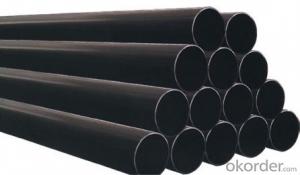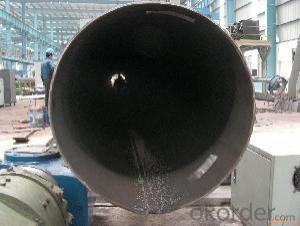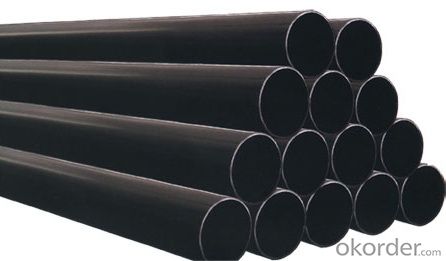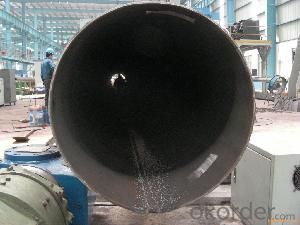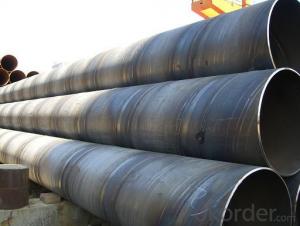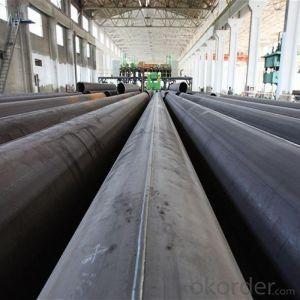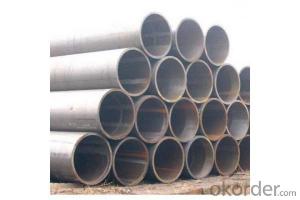API SSAW LSAW CARBON STEEL PIPE LINE OIL GAS PIPE 56''
- Loading Port:
- Tianjin
- Payment Terms:
- TT OR LC
- Min Order Qty:
- 5 m.t.
- Supply Capability:
- 3000 m.t./month
OKorder Service Pledge
OKorder Financial Service
You Might Also Like
Packaging & Delivery
Packaging Detail: | standard export packing or as customer's requirement |
Delivery Detail: | within 10 - 30 days |
Specifications
Spiral Welded Steel Pipes and Tubes
1.Material:Q195-Q235
2.Length:1-12m
3.WT:1.0-14mm
4.O.D.:20-273mm
Spiral Welded Steel Pipes and Tubes
Product Description:
1.Material : Q235,Q345,L245,L290,L360,L415,L450,L485,GrB,X42,46,X52,X56,X60,X65,X70,X80,X100
2,Standard: SY/T5037-2000,GB/T9711-2011,API Spec 5L PSL1/PSL2,ASTM A252\A53,ISO3183,DIN17172,EN10217,JIS G3457,AWWA C200,ASTM A139,ASTM A671,ASTM A672
3.Wall thickness: 3.0mm-30mm
4.Outer diameter: φ168mm-3020mm
5,Length: 5m-12m or as your requirement
6,Corrosion protection standard: DIN30670,DIN30671, AWWAC210, AWWA C203, SY/T0413-2002,SY/T0414-2002
7,Application: Oil, gas, natural gas, water pipe, thermal electricity pipe, steel structure engineering, etc
Q195-q345 Material Steel Pipe's Materials
Elements | Chemical Compsition% | Mechanical Property | ||||||
C% | Mn% | S% | P% | Si% | Yield Point (Mpa) | Tensile Strength(Mpa) | Elongation | |
Q195 | 0.06-0.12 | 0.25-0.50 | <0.050< span=""> | <0.045< span=""> | <0.030< span=""> | >195 | 315-430 | 32-33 |
Q215 | 0.09-0.15 | 0.25-0.55 | <0.05< span=""> | <0.045< span=""> | <0.030< span=""> | >215 | 335-450 | 26-31 |
Q235 | 0.12-0.20 | 0.30-0.70 | <0.045< span=""> | <0.045< span=""> | <0.030< span=""> | >235 | 375-500 | 24-26 |
Q345 | <0.20< span=""> | 1.0-1.6 | <0.040< span=""> | <0.040< span=""> | <0.55< span=""> | >345 | 470-630 | 21-22 |
Packaging & Delivery
Packaging Detail: | Normal exporting packing,in container or bulk vessel or as per clients' request |
Delivery Detail: | 2 months after confimed contract |
Specifications
Large Diameter API 5L X70 PSL2 LSAW Steel Pipe
Grade: X42, X46, X50, X52, X60, B, C
OD: 1.5"-28"
WT: SCH10-SCH160
Large Diameter API 5L X70 PSL2 LSAW Steel Pipe
Specifications:
u Standard: API 5L
u Grade: B, C, X42, X46, X50, X52, X56, X60, X65, X70, X80
u OD: 1.5"-28"
u WT: SCH10-SCH160
u Length: 5-12m
u Ends Finish: plain end, bevel end, grooved end
u Surface Treatment: bare, black varnished, oiled finish, red color, anti-corrosion, 3PE, FBE or epoxy coating
u Technique: hot rolled or cold drawn
u Application: api 5l steel pipe for conveying oil, water, gas
u Invoicing: based on theoretical weight or actual weight
u Payment Terms: L/C at sight, T/T or Western Union
u Trade Terms: FOB, CFR, CIF
u Certification: ABS manufacturing assessment, ABS design assessment, API 5CT, API 5L, DNV manufacturer certificate, ISO9001 quality management system certificate, ISO14001 environment management system certificate, GB/T28001 occupational health and safety management system certificate, A1 class manufacturing license of special equipment certificate, CCS, GL, LR, SGS, TüV, PDE
- Q: What is the difference between API 5L and ASTM A53 steel pipes?
- API 5L and ASTM A53 steel pipes differ mainly in their specifications and intended applications. API 5L is a standard for seamless and welded steel pipes used for transportation of oil, gas, and water in the petroleum and natural gas industries. It specifies requirements for the manufacture of two product specification levels (PSL1 and PSL2) of seamless and welded steel pipes. On the other hand, ASTM A53 is a standard specification for seamless and welded black and hot-dipped galvanized steel pipes used for mechanical and pressure applications. While both standards have similarities, they have different scopes and requirements, making them suitable for distinct purposes in different industries.
- Q: Difference between seamless steel pipe and welded pipe
- Seamless steel tubes are made of high quality carbon or alloy steel. They are hot-rolled and cold-rolled (drawn).The welded pipe is rolled into the steel tubular to sew or spiral seam welded in the manufacturing method, and is divided into low pressure fluid delivery with welded steel pipe, spiral welded steel pipe, welded steel pipe, welded pipe roll etc..
- Q: How is the steel pipe dance installed at home?
- Portable pipe with instructions and CD can be installed, portable steel pipe of a new patent, convenient installation, no restriction site, no drilling, readily removable, adjustable height, stainless steel, solid.
- Q: Can steel pipes be used for conveying hazardous chemicals?
- Yes, steel pipes can be used for conveying hazardous chemicals. Steel pipes are known for their high strength and durability, making them suitable for handling various substances, including hazardous chemicals. They can withstand high pressure and temperature, ensuring the safe transportation of these chemicals. Additionally, steel pipes have excellent resistance to corrosion, which is crucial when dealing with corrosive and potentially dangerous substances. Moreover, steel pipes can be easily welded and connected, allowing for a secure and leak-proof transport system. However, it is important to consider the specific requirements of the chemicals being transported and ensure that the steel pipes are properly designed, coated, and maintained to prevent any potential risks or reactions with the hazardous substances.
- Q: How are steel pipes used in the telecommunications industry?
- Steel pipes are used in the telecommunications industry primarily for the installation and protection of underground fiber optic cables. These pipes provide a sturdy and durable infrastructure for the cables, ensuring their safety from external factors such as weather conditions or accidental damage. Additionally, steel pipes are also used for the construction of telecommunication towers, providing the necessary strength and support for antennas and other equipment.
- Q: What are the different types of steel pipe supports?
- There are several different types of steel pipe supports, including pipe hangers, pipe clamps, pipe shoes, and pipe saddles. These supports are used to secure and stabilize pipes in various applications, such as plumbing, HVAC systems, and industrial piping systems.
- Q: What are the main aspects of precision steel tubes?
- Precision tube is a kind of seamless steel tube with high precision and high brightness produced by cold drawing or cold rolling.
- Q: How are steel pipes used in the telecommunications infrastructure industry?
- Steel pipes are used in the telecommunications infrastructure industry to provide a strong and durable framework for the installation of fiber optic cables, conduits, and other communication equipment. They are used for underground cable routing, overhead cable support, and the construction of telecommunication towers, ensuring reliable and efficient communication networks.
- Q: What are the environmental impacts of steel pipe production and disposal?
- The environmental impacts of steel pipe production and disposal are mainly related to the extraction and processing of raw materials, energy consumption, greenhouse gas emissions, and waste generation. The production of steel pipes requires the extraction of iron ore and other raw materials, which can lead to habitat destruction and biodiversity loss. The processing and manufacturing of steel pipes also involve significant energy consumption, contributing to carbon dioxide emissions and climate change. Additionally, the disposal of steel pipes, especially if not properly managed, can result in waste accumulation and potential soil and water pollution. Therefore, it is crucial to consider sustainable practices and recycling options to minimize the environmental impacts associated with steel pipe production and disposal.
- Q: Can steel pipes be used for underground utility lines?
- Yes, steel pipes can be used for underground utility lines. Steel pipes are commonly used for various underground applications, including utility lines for water, gas, and sewage. They are durable, strong, and resistant to corrosion, making them suitable for long-term use in underground environments. Additionally, steel pipes can be easily welded and connected, allowing for efficient installation and maintenance.
Send your message to us
API SSAW LSAW CARBON STEEL PIPE LINE OIL GAS PIPE 56''
- Loading Port:
- Tianjin
- Payment Terms:
- TT OR LC
- Min Order Qty:
- 5 m.t.
- Supply Capability:
- 3000 m.t./month
OKorder Service Pledge
OKorder Financial Service
Similar products
Hot products
Hot Searches
Related keywords
